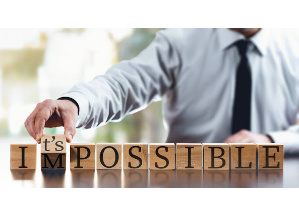Is it possible to play to win when it feels like you have both hands tied behind your back? The answer is yes—but only if you are willing to give up a common habit that simply will not work in uncertain environments.
When in the line of fire, we all have a natural tendency to focus on the constraints and limitations of a situation rather than the possibilities that exist. It takes focus, discipline and strategic awareness to ignore the white noise of doubt and envision what is possible.
Here is a scenario that might feel familiar: Your manager asks you to develop a proposal for a new program or initiative with a quick turnaround deadline. Your natural inclination is to focus on the limitations: Why do we need to do this now? We already have something like this in place. I have too many things to handle already, and this will take resources I don’t have. It probably will just sit on someone’s desk and never get acted on.
To be the confident problem-solver that can fix this immediately, you just pull something together and check it off your to-do list. This is playing not to lose, and that’s an option that looks great based on all the limitations.
This is efficient—but ultimately not effective. When you make that kind of choice, you miss out on the opportunity to shine and have greater impact in your organization.
You could instead take a different approach. You could ask yourself: How can I make this proposal really unique, something that stands out and will be appreciated? Who else in the organization has had success with something like this before? Who on my team has knowledge, skills, expertise that they could lend to this effort? How can I make this something that my team would feel proud of and would give them visibility in the company?
These questions sound time-consuming, but they aren’t; they just make you think differently. And the answers will lead you to innovations that make you the go-to resource when the heat is on.
Neuroscience shows that taking a positive approach to dealing with issues actually impacts brain cognition and structure, building capacity for you to handle future challenges more effectively. You are training our brain at the same time you are developing solutions that have greater and more lasting impact.
Let’s face it: we live in ever-changing and increasingly complex times. With all the challenges that uncertainty creates, it can be difficult to approach your work from a possibilities mindset. Uncertainty and doubt can put you on the defensive, leading you to avoid risk instead of embracing opportunity. Changing your perspective from limitations to possibilities is how you play to win—even when the odds are stacked against you.


